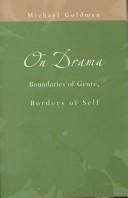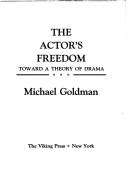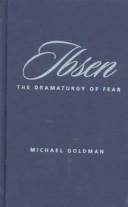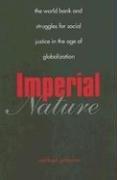| Listing 1 - 10 of 21 | << page >> |
Sort by
|

ISBN: 047211011X Year: 2000 Publisher: Ann Arbor, Mich. University of Michigan Press
Abstract | Keywords | Export | Availability | Bookmark
 Loading...
Loading...Choose an application
- Reference Manager
- EndNote
- RefWorks (Direct export to RefWorks)

ISBN: 0670103470 Year: 1975 Publisher: New York Viking
Abstract | Keywords | Export | Availability | Bookmark
 Loading...
Loading...Choose an application
- Reference Manager
- EndNote
- RefWorks (Direct export to RefWorks)
Acting --- Art du théâtre --- Dramatics --- Dramatiek --- Dramatique --- Histrionics --- Professional theater --- Scène --- Stage --- Theater --- Theater (Kunst) --- Theatre --- Théâtre (Art) --- Toneel (Kunst) --- Toneelkunst --- Actors --- Psychology

ISBN: 0231113218 Year: 1999 Publisher: New York (N.Y.) Columbia University Press
Abstract | Keywords | Export | Availability | Bookmark
 Loading...
Loading...Choose an application
- Reference Manager
- EndNote
- RefWorks (Direct export to RefWorks)

ISBN: 9780300119749 0300119747 0300104081 9786611731021 1281731021 0300132093 9780300132090 9780300104080 9781281731029 Year: 2005 Publisher: New Haven, Conn. Yale University Press
Abstract | Keywords | Export | Availability | Bookmark
 Loading...
Loading...Choose an application
- Reference Manager
- EndNote
- RefWorks (Direct export to RefWorks)
Why is the World Bank so successful? How has it gained power even at moments in history when it seemed likely to fall? This pathbreaking book is the first close examination of the inner workings of the Bank, the foundations of its achievements, its propensity for intensifying the problems it intends to cure, and its remarkable ability to tame criticism and extend its own reach. Michael Goldman takes us inside World Bank headquarters in Washington, D.C., and then to Bank project sites around the globe. He explains how projects funded by the Bank really work and why community activists struggle against the World Bank and its brand of development. Goldman looks at recent ventures in areas such as the environment, human rights, and good governance and reveals how-despite its poor track record-the World Bank has acquired greater authority and global power than ever before. The book sheds new light on the World Bank's role in increasing global inequalities and considers why it has become the central target for anti-globalization movements worldwide. For anyone concerned about globalization and social justice, Imperial Nature is essential reading.
International finance. --- Social justice. --- Wereldbank. --- Sociaal-economische ontwikkeling. --- Internationalisatie. --- #SBIB:327.7H42 --- #SBIB:35H434 --- Equality --- Justice --- International monetary system --- International money --- Finance --- International economic relations --- Specifieke internationale organisaties en samenwerking: milieu --- Beleidssectoren: milieubeleid en ruimtelijke ordening --- World Bank. --- Világbank --- Banque internationale pour la reconstruction et le développement --- Mezhdunarodnyĭ bank dli︠a︡ rekonstrukt︠s︡ii i razvitii︠a︡ --- MBRR --- Sekai Ginkō --- Kokusai Fukkō Kaihatsu Ginkō --- Kukche Puhŭng Kaebal Ŭnhaeng --- Segye Ŭnhaeng --- IBRD --- Welt Bank --- Weltbank --- Banque mondiale --- Internationale Bank für Wiederaufbau und Entwicklung --- Banco Internacional de Reconstrucción y Fomento --- Banco Mundial --- B.I.R.D. --- BIRD --- Banca Internațională pentru Reconstrucție și Dezvoltare --- Mirovoĭ Bank --- Svitovyĭ Bank --- Svitovyĭ bank rekonstrukt︠s︡iï i rozvytku --- Verdensbanken --- Międzynarodowy Bank Rozwoju i Odbudowy --- Bank al-Dawlī lil-Inshāʼ wa-al-Taʻmīr --- Bank al-Dawlī --- Världsbanken --- Banca ricostruzione e sviluppo --- Banca di ricostruzione e sviluppo --- BIRF --- I.B.R.D. --- B.I.R.F. --- Shih chieh yin hang --- Shi jie yin hang --- International Bank for Reconstruction and Development --- World Bank Group. --- Thanākhān Lōk --- Bank Światowy --- Viśva Baiṅka --- Lōka Băṅkuva --- Ngân hàng Thế giới --- Vsemirnyĭ Bank --- Bank Dunia --- Msopʻlio Bankis --- Banca Mondială --- BM --- Prapañca Byāṅku --- Banca mondiale --- Banca internazionale per la ricostruzione e lo sviluppo --- Dhanāgār Bibhab Lok --- البنك الدولي --- بنك الدولي --- 世界銀行 --- 世界银行 --- 国際復興開発銀行 --- Dėlkhiĭn Bank --- Дэлхийн Банк --- International finance --- Social justice --- Internationalisatie --- Sociaal-economische ontwikkeling --- Wereldbank --- World Bank --- E-books --- World Bank.. --- International finance.. --- Social justice.. --- Wereldbank. -- gtt. --- Sociaal-economische ontwikkeling. -- gtt. --- Internationalisatie. -- gtt. --- World Bank Group. World Bank --- Hamashkharhayin Banki --- Svetska Banka --- Internationale bank voor herstel en ontwikkeling
Book
ISBN: 0691062145 9780691062143 0691619743 0691646619 1400872510 9780691646619 9781400872510 Year: 1972 Publisher: Princeton, New Jersey : Princeton University Press,
Abstract | Keywords | Export | Availability | Bookmark
 Loading...
Loading...Choose an application
- Reference Manager
- EndNote
- RefWorks (Direct export to RefWorks)
Shakespeare's texts are seen by the poet and critic Michael Goldman as designs for theatrical experience-the complex emotional, physical, and intellectual transaction between actor and audience that brings alive Shakespeare's imagination and makes it immediate to our own. Mr. Goldman's particular concerns are these: what the audience responds to in an acted play; how Shakespeare controls and shapes this response; what the response means, and why it matters.Originally published in 1972.The Princeton Legacy Library uses the latest print-on-demand technology to again make available previously out-of-print books from the distinguished backlist of Princeton University Press. These editions preserve the original texts of these important books while presenting them in durable paperback and hardcover editions. The goal of the Princeton Legacy Library is to vastly increase access to the rich scholarly heritage found in the thousands of books published by Princeton University Press since its founding in 1905.
Theater audiences --- Drama --- Technique --- Shakespeare, William, --- Criticism and interpretation --- Theater audiences. --- Technique. --- Criticism and interpretation. --- English literature --- Shakespeare, William --- Drama - Technique --- Shakespeare, William, - 1564-1616 - Criticism and interpretation --- Shakespeare, William, - 1564-1616
Book
ISBN: 0691066302 0691611831 0691639809 1306991625 1400854806 9780691639802 9781400854806 9780691611839 Year: 1985 Publisher: Princeton, New Jersey : Princeton University Press,
Abstract | Keywords | Export | Availability | Bookmark
 Loading...
Loading...Choose an application
- Reference Manager
- EndNote
- RefWorks (Direct export to RefWorks)
This intensely personal book develops a new approach to the study of action in drama. Michael Goldman eloquently applies a method based on a crucial fact: our experience of a play in the theater is almost exclusively our experience of acting.Originally published in 1985.The Princeton Legacy Library uses the latest print-on-demand technology to again make available previously out-of-print books from the distinguished backlist of Princeton University Press. These editions preserve the original texts of these important books while presenting them in durable paperback and hardcover editions. The goal of the Princeton Legacy Library is to vastly increase access to the rich scholarly heritage found in the thousands of books published by Princeton University Press since its founding in 1905.
Tragedy. --- Shakespeare, William, --- Tragedies. --- Dramatic production. --- Acting --- Shakespeare, William
Book
ISBN: 0691639809 1400854806 0691611831 9781400854806 9780691066301 0691066302 9780691611839 0691066302 9780691611839 Year: 2014 Publisher: Princeton, NJ
Abstract | Keywords | Export | Availability | Bookmark
 Loading...
Loading...Choose an application
- Reference Manager
- EndNote
- RefWorks (Direct export to RefWorks)
This intensely personal book develops a new approach to the study of action in drama. Michael Goldman eloquently applies a method based on a crucial fact: our experience of a play in the theater is almost exclusively our experience of acting.Originally published in 1985.The Princeton Legacy Library uses the latest print-on-demand technology to again make available previously out-of-print books from the distinguished backlist of Princeton University Press. These editions preserve the original texts of these important books while presenting them in durable paperback and hardcover editions. The goal of the Princeton Legacy Library is to vastly increase access to the rich scholarly heritage found in the thousands of books published by Princeton University Press since its founding in 1905.
Tragedy. --- DRAMA / Shakespeare. --- Drama --- Shakespeare, William, --- Dramatic production. --- Tragedies.
Book
ISBN: 9781400872510 1400872510 9780691619743 0691619743 0691646619 Year: 2015 Publisher: Princeton, NJ
Abstract | Keywords | Export | Availability | Bookmark
 Loading...
Loading...Choose an application
- Reference Manager
- EndNote
- RefWorks (Direct export to RefWorks)
Shakespeare's texts are seen by the poet and critic Michael Goldman as designs for theatrical experience-the complex emotional, physical, and intellectual transaction between actor and audience that brings alive Shakespeare's imagination and makes it immediate to our own. Mr. Goldman's particular concerns are these: what the audience responds to in an acted play; how Shakespeare controls and shapes this response; what the response means, and why it matters.Originally published in 1972.The Princeton Legacy Library uses the latest print-on-demand technology to again make available previously out-of-print books from the distinguished backlist of Princeton University Press. These editions preserve the original texts of these important books while presenting them in durable paperback and hardcover editions. The goal of the Princeton Legacy Library is to vastly increase access to the rich scholarly heritage found in the thousands of books published by Princeton University Press since its founding in 1905.
Drama --- Theater audiences. --- Dramaturgy --- Authorship --- Playwriting --- Audiences, Theater --- Theater --- Theatergoers --- Performing arts --- Theater attendance --- Technique. --- Audiences --- Shakespeare, William, --- Criticism and interpretation.

ISBN: 023111320X Year: 1999 Publisher: New York Columbia University Press
Abstract | Keywords | Export | Availability | Bookmark
 Loading...
Loading...Choose an application
- Reference Manager
- EndNote
- RefWorks (Direct export to RefWorks)
Book
Year: 1999 Publisher: New York Chichester, UK Columbia University Press
Abstract | Keywords | Export | Availability | Bookmark
 Loading...
Loading...Choose an application
- Reference Manager
- EndNote
- RefWorks (Direct export to RefWorks)
| Listing 1 - 10 of 21 | << page >> |
Sort by
|

 Search
Search Feedback
Feedback About UniCat
About UniCat  Help
Help News
News